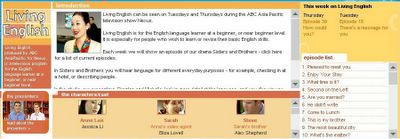幾本講到文法的書籍(複習用參考書和兩本文法書)給這類型的句子不同的名稱,有『分詞構句』、『修飾性副詞片語』等,以下的解釋和例句多數來自某複習用參考書,因為我比較過後覺得它對這類型句子的來龍去脈解釋比較集中和詳盡,我們就來稍微研究一下這一類句子。
對這種句子上手之後,不論在閱讀或寫作上都有很大的益處。
(子句是包含主詞和動詞的一組相關字;片語是不含主詞和動詞的一組相關字。)
分詞分為現在分詞和過去分詞,可以當作形容詞和
狀語用。
分詞構句的形成:
當副詞子句*的主詞與主要子句的主詞相同時
,(1)把副詞子句的主詞去掉,(2)將連接詞省略(有時可以不省略) (3)再將動詞改為分詞,主動用現在分詞,被動用過去分詞,其句型變換如下:

<↑圖>
【註】
1、分詞構句的種類可分為表時間、原因、條件、讓步及附帶狀況。
2、分詞構句前的連接詞通常省略但表『強調』時得予保留。
3、被動式的分詞構句Being+p.p; Hving been +p.p 其中 Being 和 Having been 常被省略
1、主動式:
(表時間)
While I was walking to class, I ran into an old friend.
=
While walking to class, I ran into an old friend.
=
Walking to class, I ran into an old friend.
(表因果關係,即原因)
Because she needed some money to buy a book, Sue cashed a check.
=
Needing some money to buy a book, Sue cashed a check.
(表條件)
If you turn to the left, you will find the house.
=
Turning to the left, you will find the house.
(表讓步)
Though he is a boy, he knows many things.
=
Being a boy, he knows many things.
(表附帶狀況)
His father died,
and left him no fortune.
=His father died,
leaving him no fortune.
2、被動式:
As it was written in haste, the book has many mistakes.
=
Written in haste, the book has many mistakes.
【註】written之前的Being被省略了。
完成式分詞構句 (主動為having + 過去分詞,被動為 having been +過去分詞)表示比主要子句的動詞早完成,因此若分詞所表示的動作比主要子句的動詞先完成,則要用完成式分詞。
After he
had had breakfast, he began his work as usual.
=
Having had breakfast, he began his work as usual.
Because the book
has been written in haste, it has some faults.
=(Having been)
written in haste, the book has some faults.
【註】被動式的 Having been 可以省略。(上面的註三有說到)
分詞構句的主詞必定要和主要子句的主詞相同,才可省略,否則就為脫節分詞,這是錯誤的。
副詞子句即以副詞引導的子句,引導副詞子句的詞語有:
(時間)
after
before
when
while
as
as soon as
since
until
(因果)
because
now that
since
(對比)
even though
although
though
(條件)
if
unless
only if
whether or not
even if
in case
in the event that
References:
Betty Schrampfer Azar,
UNDEARSTANDING AND USING English Grammar, Prentice Hall Regents
謝輝煌,
英文計劃復習,成龍圖書公司

 來唱歌囉--Old MacDonald Had a Farm
來唱歌囉--Old MacDonald Had a Farm







 They look like any bracelet you might buy at the mall. You probably wouldn't even notice if your child started wearing one, but these are not just any bracelet.
They look like any bracelet you might buy at the mall. You probably wouldn't even notice if your child started wearing one, but these are not just any bracelet.
 這是
這是







